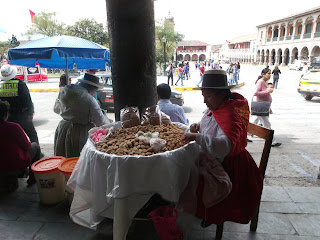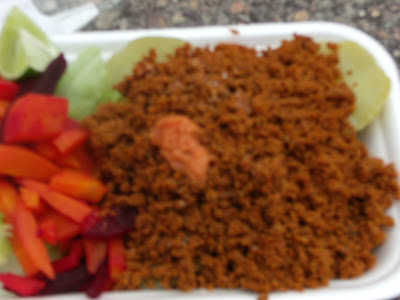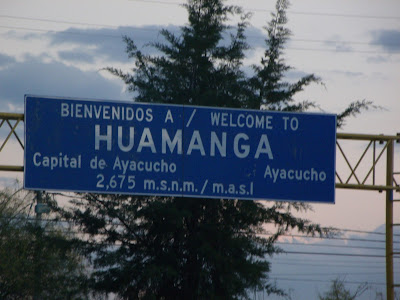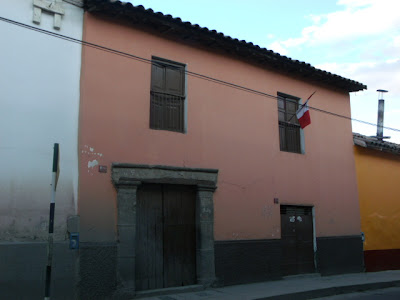Susana and I decided that for our third and final day (July 29th) in Ayacucho we'd take a tour of the surrounding area. Skipping
Wari and Quinua, which we'd both been to a bunch of times, we opted for heading somewhat it the opposite direction toward Huanta.
On the way, the tour stopped at Pikimachay cave.
Pikimachay is across a small valley from the site of Wari, and is noted for having sheltered humans some 17,000 years ago. Making it among the oldest, if not the oldest, human habitation known in the Americas (If I recall correctly, there are two other sites with claims to older human remains, one in Chile and one in Brazil, but both have been seriously questioned and are not wholly accepted within the scientific community.)
Considering the types of fauna whose remains were found alongside the human bones and teeth -animals such as glyptodonts and megatheria- I imagine that the climate of the region was wetter back then than it is now. Today there is no obvious dry-season water supply near the cave and the vegetation is sparse, scrubby, and generally prickly, consisting mainly of cacti, agaves, and molle trees.

Of those the
molles are the friendliest. In Peru the
molle is a common shade tree and the small berries it produces are used to make a type of chicha. In the US, where it was introduced by the Spanish, the molle is known as "California pepper tree" on account of the berries, whereas in Mexico it is called "
pirul" because of its origins in Peru.
The area is so dry that there are few animals, or even birds, visible. One thing that does seem to thrive are insects. In fact, walking around one was made keenly aware of the difficulties farmers must face, for not only is there the aridity, rockyness, and steepness of the land to be dealt with, but there is also no shortage of locusts.
As an illustration, in the image below, taken at the base of Pikimachay hill, there are no fewer than six locusts:
After Pikimachay, the van took us to the town on Huanta.
Huanta is located some 50 kilometers from Huamanga, and is nestled in a
green, productive valley, that earned the district the nickname of
"Emerald of the Andes."
My family's history with Huanta goes way back. Not only was Mama Pali born there, but her father was at one point mayor and several times member of the town council.
I, myself, hadn't been there since Danny and I took a trip to the city with Mama Pali and her driver, Roman, in about 1973 or 1974. We travelled in my grandparents' old red VW Beetle and carried a litter of kittens to trade and give away along the way. At one point we traded one or two of the cats for a Peruvian naked-neck chicken or qalakunka. The kittens rode in the well of the Bug, but the qalakunka decided to perch on the back seat's backrest, and at every bump and lurch in the unpaved road, the bird flapped its wings wildly to keep its balance, sending feathers everywhere and generally agitating everyone, in addition to shitting all over the back of the car. We arrived at my great-aunt's house in Huanta a lot less put-together than when we left Huamanga, I must say.
This time around, the trip was more sedate.
It being Independence Day weekend, there was to be a bullfight later in the day and the sponsoring committee was out drumming up donations to give away at the event.
After visiting the Plaza of Huanta, we headed down the road to Luricocha district for lunch.
Luricocha is a semi-rural district, with many orchards producing up to 36 varieties of avocado in addition to a host of other fruits and vegetables.
Luricocha district is also known as the hometown of singer and actress
Magaly Solier.
At Luricocha we ate at a place called Recreo Hildaria. A recreo is a country establishment with plenty of outdoor areas, often some games available such as a soccer pitch or a fussball table or
sapo, and offering hearty local fare. Many are open only on weekends and holidays.
Recreo Hildaria, it turns, out was owned and run by a friend and former schoolmate of several of my younger uncles and aunt, Sr. Ernesto Saenz Jauregui. We had a nice time chatting and catching him up on the news of the family, and meeting him provided a nice ending to a very pleasant day.








































